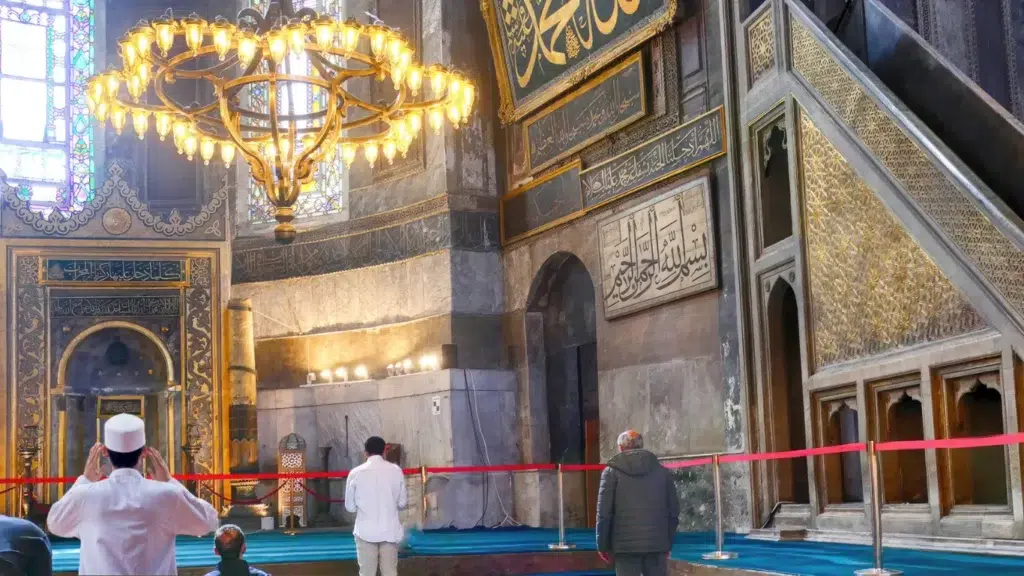اَللهُ أَكْبَرُ Allahu Akbar – Allah (God) is the Greatest. Learn the full Adhan (Islamic Call to Prayer) in Arabic, complete with English translation and transliteration. Delve into the meaning behind each line of the Azan and experience the powerful Adhan video from Masjid al-Haram in Makkah.

📣 What is the Adhan (Azan)?
The Adhan, also spelled Azan, is the Islamic call to prayer, recited five times a day to invite Muslims to their obligatory prayers (Salah). In addition, this spiritual announcement echoes through mosques worldwide, serving as a constant reminder of believers’ connection to Allah and the significance of prayer. As a result, it not only marks the time for worship but also reinforces the importance of maintaining a close relationship with the Divine.
The call to prayer beautifully encapsulates core Islamic beliefs, highlighting the Oneness of Allah and the prophethood of Muhammad (peace be upon him).
📜 Full Adhan in Arabic, English Translation & Transliteration
Here is the complete Adhan with its Arabic script, English translation, and transliteration:
اَللهُ أَكْبَرُ، اَللهُ أَكْبَرُ
Allahu Akbar – Allah (God) is the Greatest
اَللهُ أَكْبَرُ، اَللهُ أَكْبَرُ
Allahu Akbar – Allah (God) is the Greatest
أَشْهَدُ أَنْ لَا إِلَهَ إِلَّا اللهُ
Ashhadu an la ilaha illa Allah – I bear witness that there is no god but Allah
أَشْهَدُ أَنْ لَا إِلَهَ إِلَّا اللهُ
Ashhadu an la ilaha illa Allah – I bear witness that there is no god but Allah
أَشْهَدُ أَنَّ مُحَمَّدًا رَسُولُ اللهِ
Ashhadu anna Muhammadur Rasul Allah – I bear witness that Muhammad (PBUH) is the Messenger of Allah
أَشْهَدُ أَنَّ مُحَمَّدًا رَسُولُ اللهِ
Ashhadu anna Muhammadur Rasul Allah – I bear witness that Muhammad (PBUH) is the Messenger of Allah
حَيَّ عَلَى الصَّلَاةِ
Hayya ‘ala-s Salah – Hurry to prayer
حَيَّ عَلَى الصَّلَاةِ
Hayya ‘ala-s Salah – Hurry to prayer
حَيَّ عَلَى الْفَلَاحِ
Hayya ‘ala-l Falah – Hurry to success
حَيَّ عَلَى الْفَلَاحِ
Hayya ‘ala-l Falah – Hurry to success
(During Fajr prayer only):
اَلصَّلَاةُ خَيْرٌ مِنَ النَّوْمِ
As-salatu khayrun min an-nawm – Prayer is better than sleep
اَلصَّلَاةُ خَيْرٌ مِنَ النَّوْمِ
As-salatu khayrun min an-nawm – Prayer is better than sleep
اَللهُ أَكْبَرُ، اَللهُ أَكْبَرُ
Allahu Akbar – Allah is the Greatest
لَا إِلَهَ إِلَّا اللهُ
La ilaha illa Allah – There is no god but Allah
Watch the Adhan (Live from Makkah)
Watch and listen to the powerful Adhan from Masjid al-Haram in Makkah
Experience the spiritual ambiance as the call to prayer resonates across the sacred precincts of the Kaaba in Saudi Arabia.
📌 FAQ – Frequently Asked Questions
❓ What is the full translation of Azan?
The Azan translates to a declaration of Allah’s greatness, affirming His Oneness, acknowledging the Prophet Muhammad (peace be upon him) as His messenger, and inviting people to prayer and success. Furthermore, the Fajr Adhan includes the powerful reminder: “Prayer is better than sleep.” This statement, in particular, serves as a call to prioritize spiritual fulfillment over worldly rest, emphasizing the importance of devotion.
❓ What do you say during Fajr Adhan?
The caller adds:
“As-salatu khayrun min an-nawm,”
Meaning: “Prayer is better than sleep.”
This line is included exclusively in the Fajr (dawn) call to prayer.
❓ Who gives the Adhan?
The Mu’adhin (caller) gives the Adhan from the mosque, historically from a minaret, now often through loudspeakers.
❓ When is the Adhan called?
The Adhan is called five times a day, before each obligatory prayer: Fajr, Dhuhr, Asr, Maghrib, and Isha.
❓ What’s the difference between Adhan and Iqama?
The Adhan is the public call to prayer, signaling the time for worship. In contrast, the Iqama is a shorter call, recited just before the prayer begins inside the mosque.
4o mini
The Adhan (Azan) is not just a reminder; rather, it’s a spiritual connection, a public declaration of faith, and an invitation to find serenity through prayer. For Muslims, it serves as a way to reconnect with their roots. On the other hand, for others, it offers a glimpse into Islamic traditions. Regardless of background, the Adhan resonates deeply, evoking both meaning and peace. Therefore, it has a universal appeal that transcends cultural and religious boundaries.


